Pirkei Avot, usually translated as “Chapters of the Fathers” or “Ethics of the Fathers,” is the beloved Mishnaic collection of rabbinic aphorisms that has now received a new translation and historical-contextual commentary by renowned educator and theologian Rabbi Dr. Irving (Yitz) Greenberg. While acknowledging that there have been hundreds of prior translations and commentaries, Rabbi Dr. Greenberg seeks to make Avot “available to the broader public as well as those who have grown up with a rabbinic Jewish heritage” and demonstrate that “the rabbinic view of life, the biblical tradition, and history can offer spiritual guidance to a world seeking its way amid rapid cultural change and widespread moral confusion.”
Bringing a lifetime of learning to the task, Rabbi Dr. Greenberg cites rabbinic and academic sources throughout the book to provide the historical context of the sages’ quotes. He situates their sayings within the context of their lives as transmitters and protectors of the Jewish tradition and its values under Roman rule (the author often credits assistance in this regard to Rabbi Binyamin Lau’s multi-volume work The Sages, also published by Maggid/Koren), while emphasizing the teachings’ contemporary relevance. His language is characteristically soaring and scholarly, such as when he glosses the mishna that contains Rabban Gamliel the son of Rabbi Yehuda the Prince’s statements that “it is good to combine Torah study with worldly occupation” and “those who work for the community should do so for the sake of heaven” by stating “communal leadership and service done for noble motives rather than for selfish interest is of the highest order and dignity in God’s eyes. Note that these statements were made by a descendant of a family that had led the community for generations and supported itself along the way.”
While it would have been impossible for the work, especially given its stated aim of mass appeal, to cite even a major portion of the immense scholarship on Avot, the book often leaves one wanting more — some of the individual mishnayot receive pages of commentary while others get just a handful of lines. The analysis of 2:3 for example, which contains Rabban Gamliel’s warning to “be careful of the governing people…they appear to be loving friends when they are benefiting from a person, but do not stand by a person when he is struggling,” a passage ripe with both historical and contemporary resonance, receives only this comment: “Rabban Gamliel saw the exploitative and erratic behavior of the Roman authorities and their collaborators up close.” One wishes a bibliography /guidance for further reading, would have been provided, a desire which was triggered multiple times reading the text (for example, p. 260 refers to “the rabbinic interpretation of Sodomite society” but no reference is given as to where one can find this interpretation.)
These minor quibbles aside, the work succeeds in its pedagogical goals, and one looks forward to future volumes in the author’s “project to develop a Jewish narrative theology for our time.”
Dr. Stu Halpern is Senior Advisor to the Provost of Yeshiva University. He has edited or coedited 17 books, including Torah and Western Thought: Intellectual Portraits of Orthodoxy and Modernity and Books of the People: Revisiting Classic Works of Jewish Thought, and has lectured in synagogues, Hillels and adult Jewish educational settings across the U.S.





